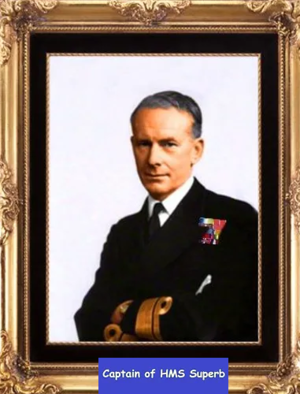Anthony Buzzard
(mariner, spook) | ||||||||||||||||
|---|---|---|---|---|---|---|---|---|---|---|---|---|---|---|---|---|
 | ||||||||||||||||
| Born | 28 April 1902 Derbyshire, East Midlands, UK | |||||||||||||||
| Died | 10 March 1972 (Age 69) West Clandon, Surrey, UK | |||||||||||||||
| Nationality | UK | |||||||||||||||
| Alma mater | Royal Naval College Osborne, Royal Naval College Dartmouth. | |||||||||||||||
| Parents | Edward Farquhar Buzzard. | |||||||||||||||
| Children | Sir Anthony Farquhar Buzzard | |||||||||||||||
| Founder of | International Institute for Strategic Studies | |||||||||||||||
Director of UK Naval Intelligence from 1951-1954. Attended the 3rd and 4th Bilderbergs after retiring
| ||||||||||||||||
Rear Admiral Sir Anthony Buzzard was an officer in the Royal Navy who was Director of UK Naval Intelligence from 1951 to 1954. He attended the 3rd and 4th Bilderbergs after retiring.
Early life
Anthony Wass Buzzard was born on 28 April 1902 at Lea Green in Derbyshire, the home of his mother's father, son of prominent physician and Regius Professor of Medicine at the University of Oxford Sir Edward Farquhar Buzzard. Anthony was raised in Surrey at his father's estate, Munstead Grange. His father was a doctor and Honorary Physician to King George VI. In 1929, his father was created a baronet, of Munstead Grange in the Parish of Godalming in the County of Surrey. Anthony was the second eldest of five siblings: Margaret, Anthony, Sylvia, and Isabel. He attended a preparatory school from age eight to thirteen, and studied at the Royal Naval College, Osborne, followed by the Royal Naval College, Dartmouth. In 1915, at the age of thirteen, he joined the Royal Navy as a midshipman, and served during the First World War.[1]
Second World War
Buzzard commanded the destroyer HMS Gurkha during the early years of the war,[1] and his actions during her sinking led to the award of the Distinguished Service Order. Gurkha was part of a force of cruisers and destroyers sent by the British in the immediate aftermath of the German invasion of Norway on 7 April 1940. Gurkha was the first British destroyer sunk by an air attack.[2] On 19 April the British ships were attacked by Junkers Ju 88 and Heinkel He 111 bombers.[2] Gurkha was hit by one bomb on the aft end, which blew a forty-foot hole in the starboard side.[2] The stern caught fire. She then sank; the crew were rescued by the light cruiser HMS Aurora at the last moment; Aurora managed to rescue 190 officers and men.[2]
Buzzard was then one of the captains assigned to visit the parents of those lost in the sinking of HMS Hood to offer his condolences. By 1941 Buzzard was serving as gunnery officer aboard the battleship HMS Rodney[1] during the pursuit and sinking of the German battleship Bismarck,[1] with the Rodney being the first ship to open fire with her own guns. On 14 October 1941 Buzzard was appointed as an Officer of the Order of the British Empire for his service.[3] Buzzard then served as assistant director, in the Admiralty Plans Division, and as a member of Joint Planning Committee, with the War Cabinet between 1942 and 1943.[1]
Buzzard became captain of the aircraft carrier HMS Glory.[1] He spent three months overseeing the final fitting out before Glory was commissioned on 21 February 1945. On 14 May the ship became operational and departed her harbour, bound for the Mediterranean. From there she went on to Fremantle, where she arrived in time for Victory over Japan Day. Once V.J. Day was over, the ship went to Rabaul for the signing of the surrender of the Japanese forces there.
He inherited the Buzzard baronetcy upon his father's death in December 1945.[4]
Buzzard was assigned to the Royal Naval Air Service after the end of the war, and commanded the cruiser HMS Superb between 1946 and 1950.[1] In 1951, at the age of forty-nine, Buzzard became the youngest man to be appointed Director of Naval Intelligence. He was promoted rear admiral. As Director of Naval Intelligence, Buzzard helped develop the nuclear deterrent policy in the early 1950s and was fundamental to it. He was in the post until his retirement in 1954.[1]
After his retirement from the military he joined the defence contractor Vickers-Armstrong, during the Cold War. Buzzard was a founder member of both the Institute of Strategic Studies, and the Council of Christian Approaches to Defence and Disarmament.[1] He frequently corresponded with Henry Kissinger, and developed the idea of "Graduated Deterrence". Graduated Deterrence posited that one must issue a reasonable threat to one's enemy that is also realizable and not so massive that no one believes that it will ever happen. During the 1960s he sat on the Minister of State for Disarmament, Lord Chalfont's Disarmament Panel. In 1967 he became Chairman of the British Council of Churches Committee on the Middle East.[1]
Events Participated in
| Event | Start | End | Location(s) | Description |
|---|---|---|---|---|
| Bilderberg/1955 September | 23 September 1955 | 25 September 1955 | Germany Bavaria Garmisch-Partenkirchen | The third Bilderberg, in West Germany. The subject of a report by Der Spiegel which inspired a heavy blackout of subsequent meetings. |
| Bilderberg/1956 | 11 May 1956 | 13 May 1956 | Denmark Fredensborg | The 4th Bilderberg meeting, with 147 guests, in contrast to the generally smaller meetings of the 1950s. Has two Bilderberg meetings in the years before and after |
References
Wikipedia is not affiliated with Wikispooks. Original page source here